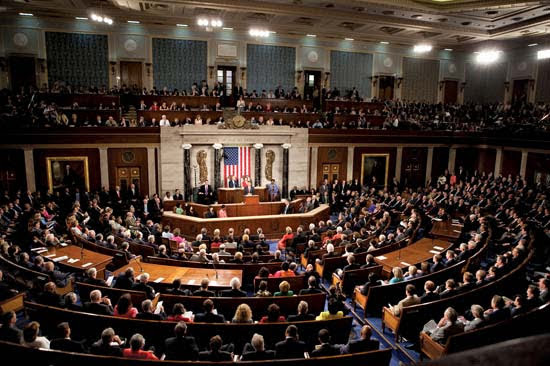The Current State of the Legislative Process

The House of the US Congress (Encyclopedia Brittanica)
April 1, 2018
Anyone who has ever listened to the iconic Schoolhouse Rock song “I’m Just a Bill” knows how complicated the legislative process is in the United States. In order for any sort of law, regulation, or ordinance to be passed, it must go through Congress—a stipulation set by the first article of the first section of the Constitution of the United States of America. However, the Constitution does not require any of the various hoops lawmakers jump through.
According to the official U.S. Congress website, there are 9-13 steps to take in order to pass a bill (you can read more about it here). While fairly straightforward on paper, a bill must bounce around from committees, to the House of Representatives, to the Senate, and then back to more committees several times before it lands in the hand of the president. Often, this process can take up to several years, as different government representatives struggle to find compromise. To exacerbate the slow pace, political parties frequently stage filibusters or purposely prolong the passing of a bill through argument.
The inefficiencies of this system are clear to the American people. Junior Michael Manning noted that “legislation takes a really long time to pass in the US.”
With such a delayed system, the government can take too long to address the needs and wants of U.S. citizens. An unresponsive government can be extremely frustrating for Americans, regardless of political affiliation. Our bicameral congress, as outlined in the Constitution, serves the people–those who elected the congressmen and women.
Disillusionment with the government only serves to anger and upset Americans. Junior Lindsey Vogelmann expressed that “[the slow legislative process] is incredibly frustrating, especially when imperative changes are time-sensitive.”
Currently, as more high schoolers and young people become actively involved in politics and activism, the lack of immediate change can feel discouraging. Often, adamant supporters of particular legislation face frequent disappointment as bills fail to pass on to the next level of approval.
The U.S. Congress, comprised of elected officials of the people of the United States of America, has an obligation to work to the best of its abilities. House and Senate representatives need to express more bipartisanship and willingness to compromise. With compromise, representatives can work together, rather than against one another, and help do what is best for the American people.

































